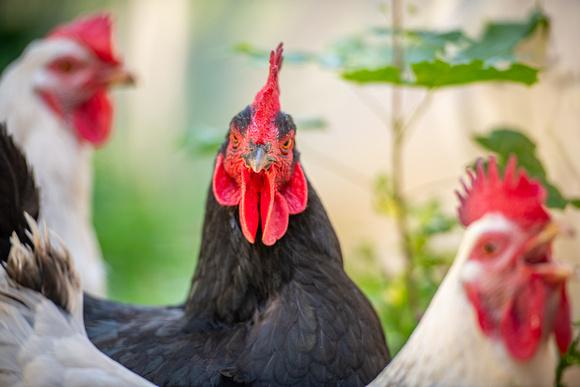Diseases
There will come a time when you will encounter a sick bird. As a small flock owner, you should be able to recognize the signs and symptoms of common diseases to maintain good flock health. Knowing how to recognize the signs and symptoms of disease will ensure that you administer proper treatment to your bird or flock. Being knowledgeable of common diseases will also help save money in the long run.
Good biosecurity practices decrease your birds' risk of infection but even if a good biosecurity plan has been developed, birds may get sick. Aspects to consider when creating a farm biosecurity program to maintain a low disease risk are eliminating disease-carrying vectors, vaccinating all birds, and maintaining clean facilities. Maintaining a low disease risk on your property can be accomplished by having good management practices.
Study the flock daily for signs of discomfort, disease, proper feed, and water consumption. With experience, you should be able to look at the birds and determine if they have a problem. Keep in mind that all poultry are living animals that may require special needs. If you notice a bird that is sick or whose performance is poor, culling that bird may be necessary. Culling birds from the flock is a key part of the job to maintain good flock health and performance.
Separating Birds by Age & Species
Birds should be separated into flocks according to age (younger flock vs. older flock), especially if multiple flocks are to be kept on the same farm. Older birds will pick at the younger birds, often causing injury. NEVER run a mixed species flock. By mixing species, disease control can be extremely difficult.
Young birds are more susceptible to disease because the immune system of young birds has not had time to strengthen. As an animal grows from adolescent to adult, the immune system develops, becoming stronger to fight infection. Older birds can handle more exposure because their immune systems are more developed. It is for this reason that young birds should be worked and handled before working older birds. Within your enclosure, setting up a small circle pen for young poultry (making sure older birds cannot reach young birds) or having a separate enclosure for younger and older birds are two ways to separate birds into various age groups.
Eliminating Vectors
A vector is anything that can carry microbes (or pathogens) that cause disease between two individuals or areas. Often referred to as "the one who carries", vectors can be mechanical or biological. Some examples of mechanical vectors are equipment or clothing; whereas, biological vectors include rodents, wild birds, insects, and parasites. Rodent and wild bird control programs should be developed for the property. Rodents will consume and contaminate feed. They may also destroy eggs, chicks, equipment, and structures. Rodents, parasites, and insects can be effectively controlled with preventative measures and proper use of insecticides and medications (Carey, 1997). By minimizing vectors on the farm, disease risk is significantly reduced.
Vaccination
Having biosecurity as part of your daily routine tremendously reduces the risk of disease and disease transfer. The use of vaccines can play a big part in protecting your birds. Yet many small poultry flock owners do not vaccinate their flock. The most common reasons for not vaccinating include:
"I rarely have disease problems."
"I was unaware the disease was present."
"The vet misdiagnosed the disease."
"I do not know where to purchase vaccines."
"Vaccines are too expensive because poultry vaccines usually come in 500 to 10,000 dose vials. I only have a few birds."
Excuses for not vaccinating your flock can lead to detrimental income loss if your flock contracts a disease. Vaccines are an excellent way to help control many diseases that small poultry flocks suffer from by helping prevent and/or reduce the adverse affects of specific diseases. You should especially make certain your birds have been vaccinated if: 1.) you will or are taking birds to fairs and exhibits; 2.) buying birds to add them to your existing flock; or 3.) have had disease problems in the past.
Giving vaccines are a preventive measure towards disease and the resulting symptoms from infection. Vaccines usually come in two types: live or killed virus. Some birds may become sick even if they have been vaccinated. Vaccinations are not a guarantee to eradicate disease, but they can slow down the spread or halt an outbreak. Vaccines are an excellent insurance policy, but are no substitute for good effective management.
Where can I purchase vaccines?
Hatcheries and poultry suppliers are excellent places to purchase vaccines. Because vaccines usually come in large quantities, vaccinate the entire flock(s) at one time and/or coordinate with neighboring flock owners to share large quantity of vaccine and expense (Jacob et al., 2003).
References:
Carey, J.B., Prochaska, J.F., and Jeffrey, J.S. 1997. Poultry Facility Biosecurity. Texas Agriculture Extension Service-The Texas A&M University System. Publication L-5182. http://gallus.tamu.edu/Extension%20publications/I-5182.pdf. Accessed June 2008.
Jacob, J.P., Butcher, G.D., and Mather, F.B. 2003. Vaccination of Small Poultry Flocks. University of Florida-IFAS extension. Gainsville, FL. Publication PS36.
